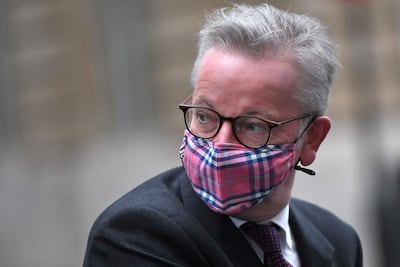Michael Gove says venues will not be able to ban people if they have not been vaccinated against coronavirus.
The UK Cabinet Office minister said he did not think vaccine passports would be needed to open up society.
That puts him at odds with vaccine minister Nadhim Zahawi, who said on Monday many businesses would require proof that customers had been inoculated against the virus before they could be served.
Mr Gove said it was important to get as many people as possible vaccinated but did not think it was necessary for people to show vaccine passports before they enter a pub, restaurant or theatre.
“We’ve got to persuade people that are opposed to taking a vaccine that it’s in our collective interest,” he told Sky News.
“The most important thing is that there are three vaccines that are going through appropriate testing to make sure they are absolutely safe.
“I am certainly not planning to introduce any vaccine passports and I don’t know anyone who is.”
Mr Gove also said he was confident there would be no need for a third lockdown and the UK was on the right trajectory.
His comments come as Prime Minister Boris Johnson battles to win support for the tier system that will be imposed after lockdown.
Almost 99 per cent of the country was placed in the most stringent two tiers of coronavirus restrictions.
Tory rebels are vehemently opposed to the plan, which they will say will inflict severe economic damage on many parts of England.
But Mr Johnson defended the tough new rules.
“I know that lots of people think that they are in the wrong tier and I understand people’s frustration,” he said.
“The tiering system is tough, but it’s designed to be tough and to keep it under control.”
The Labour Party said it will abstain in the vote on the new measures on Tuesday, meaning they are expected to be approved, but a big rebellion by Tory MPs would embarrass Mr Johnson and highlight his conflict with a growing number of Conservatives over his response to the pandemic.
As many as 100 may rebel because they say the new rules are too harsh.
It will be the first time Labour has refused to back virus measures as party leader Keir Starmer accuses Johnson of failing to plan for the economic effect of the curbs.
He said the party will not vote against the restrictions because there is a “national interest” in controlling the virus, but it will register its opposition to the broader strategy.
Health Secretary Matt Hancock urged MPs to back the rules to build on the success of the four-week lockdown, which he said had got the virus “back under control” and resulted in a 30 per cent fall in the number of cases in the past week.
“It is the best way to avoid a third lockdown, and it is the most proportionate way to take the action that we need to keep people safe,” he said.
“While we can let up a little, we can’t afford to let up a lot.”
In an attempt to calm the potential rebels, ministers published a 48-page document on Monday analysing the health, economic and social effects of the tier system.
But there was little of the detail demanded by Tory MPs on how the new rules will change the economic picture in comparison with alternative approaches.
“It is not possible to forecast with confidence the precise impact of a specific change to a specific restriction,” the authors said.
The document emphasised the consequences of not bearing down on the virus, saying without tough measures, transmission would spiral significantly, leading to increased death rates that no government “would willingly tolerate”.












